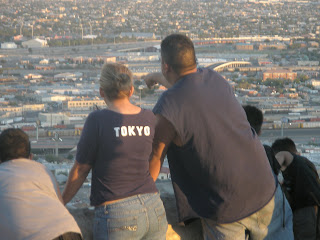 great bike ride. On my first ride up someone looked at the mansions and remarked, “I bet these houses sell for a lot with such nice views of all the poverty that makes them rich.” Although that is probably not why the residents enjoy the view, it is indeed an intense contrast seeing a mansion in a peaceful neighborhood, with big windows that watch over the slums, the border, and the most dangerous city in the world—Ciudad de Juárez.
great bike ride. On my first ride up someone looked at the mansions and remarked, “I bet these houses sell for a lot with such nice views of all the poverty that makes them rich.” Although that is probably not why the residents enjoy the view, it is indeed an intense contrast seeing a mansion in a peaceful neighborhood, with big windows that watch over the slums, the border, and the most dangerous city in the world—Ciudad de Juárez.One day I biked up the hill and relaxed at the top while the sun was setting and people were coming and going to enjoy the view. One notable part of the view is very large white letters on a mountain in Juárez which read, “La Biblia es la verdad. Leela!” “The Bible is the truth. Read it!” A family showed up and began taking pictures of the overlook. With great emotion one of the younger boys pointed to the writing on the mountain in Juárez and said, “Mommy, look, I think that says Hollywood!” The mother responded, “No honey, I don’t think that says Hollywood, I think it is something about the Bible. It says the Bible is good. Ha! See kids, I told you the Bible was good!”
Juárez is certainly far from Hollywood. It also happens to be very far in many ways from it’s own neighbor, El Paso, despite looking like just one city from the overlook.
Juárez’s population of 1.6 million is twice El Paso’s population of around 742,000. For a few reasons Juárez’s population has been increasing dramatically as of late. It often goes unnoticed that Juárez is actually the final destination for many migrants. Since NAFTA, many American companies have put factories in Mexico, called “Maquillas,” right along the border, which has created many low wage, but somewhat consistent jobs. Juárez has one of the strongest economies of any Mexican city, and many people travel to Juárez for work with no intention of crossing the border. If they can’t find work in Juárez as they had planned, then they might cross the border.
Despite having half of Juárez’s population, El Paso has far more active police officers than Juárez (1,728 to 1,300), meaning that the officer per capita rate is at least twice as high in El Paso than in Juárez. For example, if Juarez has one police officer for every 100 people, El Paso has one police officer for every 50 people. However, the Mexican Government recently called on the Mexican Military to serve as the officers in charge, which proved to be a very controversial decision.
Some people may say that El Paso’s higher number of police officers attributes to its incredible safety, but criminologists say it is another factor. El Paso seems like it should be prone to crime for many reasons. First, it is located across the border from what is now
 considered the most dangerous city in the world where 1,600 people were murdered last year. Second, it has many immigrants—undocumented and documented—whom the media often portrays to be perpetrators of crime. Lastly, El Paso’s poverty rate lingers around 27% (over twice the national average). All of these factors might lead someone to think El Paso is a dangerous place, and in fact, many of my friends expressed great fear for my safety in El Paso. Speaking on the phone, one of them asked me, "Can you walk on the street by yourself ever?" My answer? "Yes."
considered the most dangerous city in the world where 1,600 people were murdered last year. Second, it has many immigrants—undocumented and documented—whom the media often portrays to be perpetrators of crime. Lastly, El Paso’s poverty rate lingers around 27% (over twice the national average). All of these factors might lead someone to think El Paso is a dangerous place, and in fact, many of my friends expressed great fear for my safety in El Paso. Speaking on the phone, one of them asked me, "Can you walk on the street by yourself ever?" My answer? "Yes."To the great surprise of many, there were only 18 people killed in El Paso last year, making it the third safest large city in the country in terms of violent crime. But, with all the factors listed above, how could it be so safe…safer than all but two large cities in the US? Many studies done both independently and by the government for the past 100 years have shown that immigrants are actually less likely to commit crimes than native citizens. So it is in fact the immigrant population itself that makes El Paso so safe.
One irony in the relationship between the cities is that the mayor of Juárez lives in El Paso. At first this seems absurd, but I guess if he can, why not?
People wonder about Juárez’s violence spilling North over the border, but I wonder why El Paso’s safeness isn’t spilling South over the border. This year, since January 1st, there have been 1,420 murders in Juarez. It is the single most dangerous city in the world, with 130 killings per 100,000 people. To compare, Baghdad ranks 10th on the same list. But how could it be so dangerous if it is right next to the third safest city in the US?
One reason that Juárez is dangerous is the strong drug cartels, which are fueled with guns from the US, and with money from the vast US narcotics market. Also of concern is the number of criminals that the US deports to Juárez. Just out of jail, dropped in a new city, knowing nothing more than crime to get by, what might one do?
El Paso is safe because of the high immigrant population. Juárez is dangerous because of the cartels, which are essentially employed by the US narcotics market and armed with US guns. It appears to me that the northern counterpart is safe because of what the south gives it (immigrants), and the southern counterpart is dangerous because of what the north gives it (money and guns). This arrangement seems incredibly twisted.
Aside from population, police force, and homicides, there is a lot to describe about the emotions and ethos of the Juárez-El Paso neighbor relations. To begin, it is an unbalanced relationship. If you want to go into Juárez from El Paso, you simply drive, walk, or bike in, with no checkpoint or stops. Coming back to El Paso could require multiple hours in a line and a crossing fee. Any person north of the border can go into Juárez whenever they choose. But only a select few from south of the border can travel north. I often take this ability of mine for granted.
When one of the guests from Mexico left a few days ago to head back home, I said that maybe someday I could visit him. He seemed surprised and asked, “Tienes papeles? Do you have papers?” Immediately I laughed, because it seemed so obvious to me that I could just go into Mexico if and when I pleased. I then realized that he was serious, and justifiably he had assumed that since you need papers to get into the US, you would also need papers to go into Mexico. I was taken aback by my laughter because it exemplified how one-sided the relationship of travel is between these cities and between these countries.
Also, the ancestral culture here is very different than any place that I have lived. Before I came down here, I would have been hard pressed to list five people I know that migrated to the US in their lifetime, or even five people whose parents had migrated to the US. Here, I would be hard pressed to list five people who don’t fit that criterion. At one point, a boy at the house continued to ask me, “eres gringo?” which, to my knowledge translated to, “are you white?” but because it was so obvious that I was white, I figured their must be something more than the color of skin to the term gringo. While I stood confused, another girl jumped in and said, “Yes, you are a gringo! Because you were born in the US right?” “Yes” I said. “And were yours parents born here to?” She continued. “Yup!” “And not yours parent’s parents too, right?” “yea, they were born here to.” I said. She responded, “wow, that’s like a lot of years, and soo much family. You really are a gringo!” Having grandparents who were born in the US seemed so typical to me, but I have learned that here in El Paso, that is a very rare thing.
Through the comparison of data and ethos between the two cities, and their relationship, it is clear that these cities are very different from each other despite their proximity. I was marveling today that eleven blocks from the peaceful bench where I sit, is the most dangerous city in the world.
I had always viewed the border as being something that separated the two cities. But now that I am here, I am beginning to think that as different as these two cities are, maybe the border is the only thing that holds them together.




